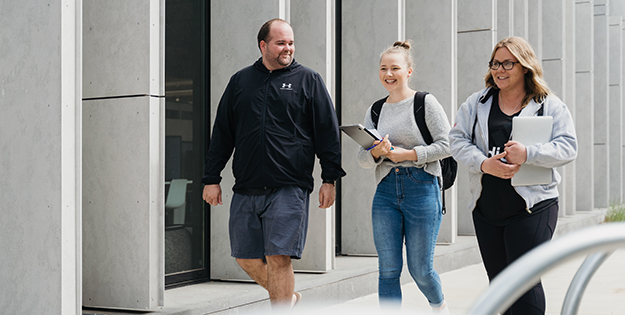Future student
Copyright@ Australian Catholic University 1998-2026 | ABN 15 050 192 660 CRICOS registered provider: 00004G | PRV12008
Copyright@ Australian Catholic University 1998-2026 | ABN 15 050 192 660 CRICOS registered provider: 00004G | PRV12008

Thinking about pursuing a PhD but not sure where to start? We spoke to Chiara Condotta, ACU Senior Candidature Officer, to clear up the common misconceptions around how to choose an institution to undertake a PhD, how to find a supervisor and how to apply.
“Find out which universities support the area of research you wish to pursue. Not all universities support research in all areas of knowledge. ACU’s research priorities are theology, philosophy, education and health; we support PhD candidates in those areas.”
“Once you have identified which universities do offer a PhD in the area of study you wish to pursue, look over their website, which will give you an idea of their mission and background, their research priorities and what support they are offering research students during candidature. Once you find the university that fits, it’s time to search for a supervisor.”
“Most institutions have a supervisor register, so if you are not already in contact with someone, then you can look through the register to find out if there is anybody at the institution who is researching in the area of study you wish to pursue. At ACU, you can search for a supervisor on our website. It’s also good to note that supervisors normally are not required to be at the same campus as you.

“Remember that these are only potential supervisors. Although they may be willing to supervise you, this does not guarantee you will be admitted to the program or that they will be one of your supervisors. If your application for admission is successful, the university will allocate a suitably accredited supervisor to you.”
“It varies from institution to institution and within each faculty of an institution. In some instances, they are happy for you to contact a potential supervisor directly, in others they prefer if you contact the Faculty Research Office. If the university is happy for you to contact a potential supervisor directly, they will supply you with contact details.”
“The real issue is to see whether your personalities will fit. That can be hard to judge, but while you’re visiting potential supervisors, try to meet some of their current students as well as other colleagues. They’ll know things about supervisors that the supervisors don’t know themselves. Buy them a coffee and ask them if they enjoy being part of the research group.”
“Your supervisor will be a mentor, friend, confidante, sounding board, advisor and a voice of reason. Over the course of your study they will encourage you, challenge you and help steer you towards successfully submitting your thesis.
“At ACU, supervisors are given a clearly defined list of responsibilities as outlined in our Higher Degree Research Supervision Policy.”
“This varies depending on the type of research being undertaken, what stage of the PhD the candidate is at and how the candidate and supervisor prefer to work. Normally, once a week is recommended as an absolute minimum.”
“Yes. At ACU, applicants for the Doctor of Philosophy and Master of Philosophy must complete a 2,000-word research proposal. You will need to describe your research problem, aims, theoretical background and hypotheses/research questions, methodology and approach, timeline and resources required. Don’t forget your bibliography/referencing section.

“Applying for the Doctor of Education, Master of Education (Research) and Master of Theology (Research) is a little different. You need to complete a 250- to 500-word research proposal describing your problem, proposed methodology and resources required. Again, you need a bibliography/referencing section.
“Remember to discuss your research proposal with your supervisor. They will be very helpful.”
“We have outlined this process step-by-step online. After you’ve submitted your application, it’s time for us to assess it. Bear with us – there’s a lot to process. It normally takes around two months for an application to be assessed. You’ll receive confirmation of your application and we’ll let you know the outcome as soon as we can.
“While you’re waiting, we suggest you get familiar with the different stages of your upcoming candidate journey, from enrolment to graduation.”
“Include plenty of information and documentation to inform the selection panel about your research background; for example, abstracts from any published articles, chapters in books, or abstracts from any completed thesis. Ensure your documents are certified. Include all transcripts of results of all tertiary studies attempted, even if you didn’t finish the program. Also read all instructions carefully and note deadlines – especially for research scholarship applications.”
Ready to start your PhD journey? If you have questions email our Candidature Services team. Otherwise, explore our research degrees to get started.
Copyright@ Australian Catholic University 1998-2026 | ABN 15 050 192 660 CRICOS registered provider: 00004G | PRV12008